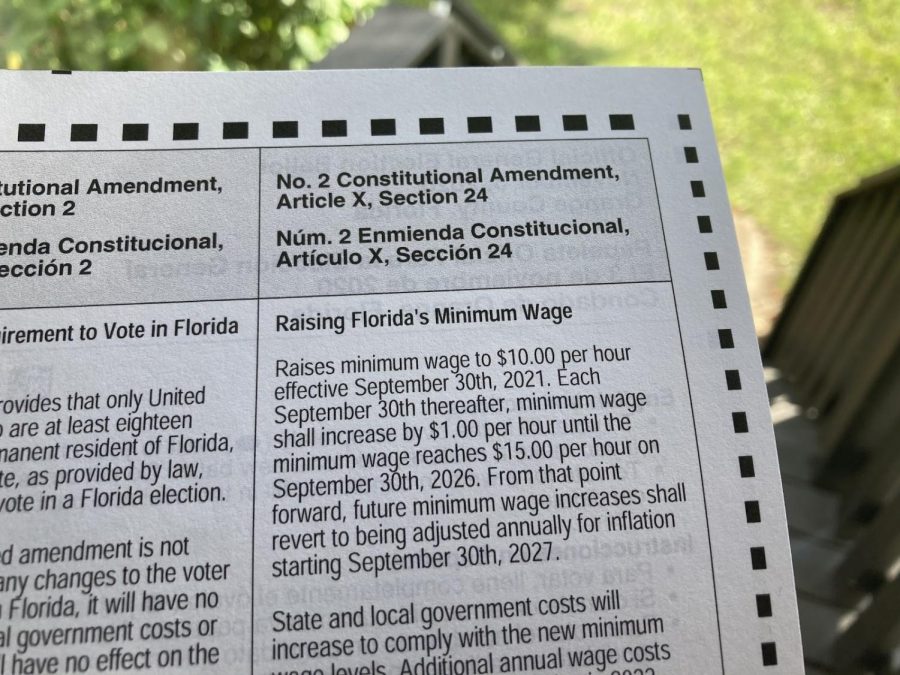Amendment 2 Brings Opportunity to Raise Minimum Wage
Amendment 2 shown on an Orange County mail-in ballot above which has begun being sent out.
November 3, 2020
Floridians have the opportunity to vote in a higher minimum wage this year through a ballot initiative this November.
The amendment, titled “Raising Florida’s Minimum Wage,” would increase the state’s minimum wage from $8.56/hour to $10.00/hour in 2021, and then increase thereafter by $1 increments over the span of 6 years to reach a $15.00/hour minimum wage.
A ‘yes’ vote on the amendment would result in the proposed changes to the state’s minimum wage. Starting on Sept. 30, 2021 the minimum wage would jump to $10.00, and then gradually transition to $15/hour by the year 2026.
A ‘no’ vote would keep the state’s minimum wage at $8.56, there would be no raise in the minimum wage for hourly or tipped workers.
The amendment is controversial along party lines. Opponents like the Republican Party of Florida and organized opposition campaign “Amendment 2 Hurts You” argue that the economic impacts of a proposed minimum wage increase would be devastating for Small Businesses, emphasizing the pandemic’s economic impact is enough during this time.
In a recent economic report put out by “Amendment 2 Hurts You” on Labor Day, the analysis reads that “By 2026, the economists estimate that 158,000 jobs will be lost because of a $15 minimum wage.” The report goes on to emphasize the impact they project the amendment to have on the hospitality and tourism industry, reading “Should the hospitality industry face slower growth than other industries, this figure would rise to 181,000 lost jobs.”
The “Amendment 2 Hurts You” campaign says that the job loss and economic fallout projected from the passage of Amendment 2 is too drastic on Small Businesses, especially during a pandemic.
Proponents of the amendment like the Orlando Democratic Socialists of America disagree with the argument. Grayson Lanza, Co-Chair of the chapter explained “I don’t think anyone’s sympathetic to that argument. Especially because Republicans run this state. [They] all ran and designed our unemployment system which left people without income for months here in Florida. You can’t really say who can do what during a pandemic with that.”
Lanza argues that Amendment 2 would benefit workers living under the poverty line. “About 46-52% of all Florida households are working poor, which means they are employed full-time but can’t meet their basic needs. Florida is an exceptionally poor state, and it’s only getting poorer as exacerbated by COVID-19. Florida is a very poor state that is extremely reliant on service industry jobs and low wage jobs and has extreme wealth inequality, some of the worst. Amendment 2 if passed will make a big difference in people’s lives, and it’s only a first step to create a more equitable and just state,” says Lanza.
Community members and Valencia College students on campus gave their thoughts on the matter.
“I think that the amendment will help other people in my age group become independent, and successfully pay for better education. As inflation increases, it seems necessary to raise wages. Therefore, I think it will be a good thing. I will be voting yes,” said 20-year-old David Smith, a computer science major at Valencia’s Osceola Campus.
“Amendment 2 hurts everyone. Labor will be cut, jobs loss, benefits lost. Not everyone can afford to pay their employees. That’s not to say it wouldn’t be nice, but it’s not as simple as saying ‘hey here’s more money.’ This will cause inflation and the entirety of the middle class will be most affected by it. There will always be a class system and increasing minimum wage is a pipe dream that leads nowhere,” said 23-year-old Liam Dewitt, a nursing major from East Campus.
“I think it is a good thing. The current paycheck for the average working class family simply isn’t enough to meet expenses. Though one of the drawbacks of the amendment mentions a possible increase in overall prices of goods/service if the minimum wage does increase, it is something that the government themselves should prevent from happening. It is the government’s duty to serve the average person and not the profits of corporations,” said Sebastian Valenzuela from Valencia’s Poinciana Campus.
“The real question is a question of tradeoffs: Do the increasing wages for some who retain their minimum wage job outweigh the lack of opportunity for other workers who might lose their job or have their hours cut?” said Valencia Economics professor, Lili Carneglia
On the impacts here at home in Central Florida, the professor adds “It’s hard to say just what the impact would be here in Orlando. Amendment 2 would probably have less of an impact on Orlando’s economy compared to other, lower-cost regions of Florida since the median hourly wage here is above the current minimum wage, but some job losses and hour cuts for minimum wage workers seem likely.”
In May 2019, Orlando recorded an average median wage of $16.50, according to a report by the Bureau of Labor Statistics analyzing the Orlando-Kissimmee-Sanford region.
The amendment is currently at the fate of voters both in the ballot box and in the mailbox. Amendment 2’s full amendment text may be found on Ballotpedia.




